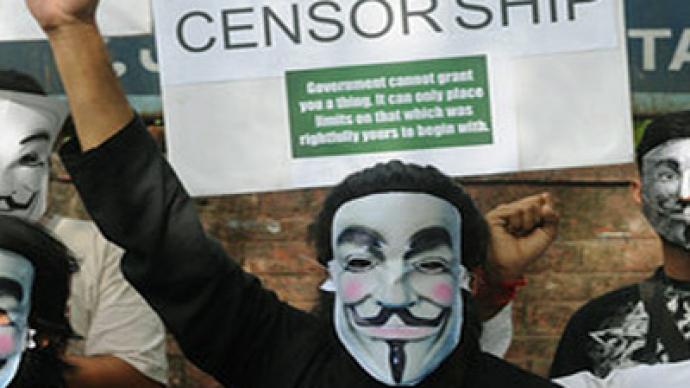#Anonymous hacks India IT minister’s webpage in wake of Facebook arrests

Hacktivists defaced the website of India’s telecoms minister after nationwide anger at authorities crackdown on online comments. The Supreme Court has ordered several provinces to explain recent arrests over “offensive” Facebook entries.
The particular cause of the ongoing public uproar in India is a 2008 amendment to the Information Technology Act, which makes it a crime to digitally send “any information that is grossly offensive or has menacing character.” The law was set up with the aim of clamping down on hate speech.The penalty under the controversial Section 66A can put a person in jail for three years for an email or any online entry. The vague wording of the amendment gives room for interpretation, which has resulted in a string of arrests viewed by many as excessive. In recent developments, two women were seized a week ago in Mumbai, Maharashtra state, over the comments they made about the funeral of the hard-line politician, Bal Thackeray. As Mumbai was shut down as part of the commemorations, Shaheen Dhada, 21, wrote on her Facebook: "Every day thousands of people die, but still the world moves on. Today, Mumbai shuts down out of fear, not out of respect."Almost instantly, she got a call from a stranger who, the girl later told the press, asked: "Do you really think whatever you posted is right?”
Dhada deleted her comment, but soon a violent mob gathered at her uncle's medical clinic. When the police arrived, they chose to detain the young woman. Dhada was taken to a police station and made to apologize in a written statement. A friend of hers, Renu Srinivasan, who "liked" the post, was detained with her.The two were later released on bail and case the against them was dropped on Thursday. But on Friday their case, together with a bunch of similar ones, made the core of a petition challenging Section 66A in the Supreme Court. Critics see the 2008 amendment as a draconian limit on free speech."The Maharashtra government is directed to explain the circumstances under which the two girls were arrested for posting comments made by them on Facebook," concluded the judges as the Press Trust of India quotes them.The court gave the state four weeks to respond. The same requests were sent to the government in West Bengal state and the southern city of Pondicherry, where several more arrests were made under the same Section 66A. On Thursday, India's telecoms ministry issued new guidelines which are set to make it harder for the police to arrest people for online comments. Now, a senior officer must sign-off before a complaint can be registered under the controversial amendment.But Friday bought the news of an attack on the telecoms minister’s website. Kapil Sibal’s personal webpage was taken offline for hours as hackers associated with Anonymous India (AnonOpsIndia or #OpIndia) group defaced the site.
Kapil Sibal's site is getting trolled links to come up soon. IT Act #66A
— AnonOpsIndia (@opindia_revenge) November 29, 2012
Hackers posted comments and edited photos, while the "About" section came to describe Sibal as "Born with a below-60 IQ he thought he could mess with the Internet and let the elite of his party suppress freedom of speech," as quoted by the India's Computer World magazine.The saga has already led to the suspension of two senior police officers and the transfer of a judge. But with mounting public pressure authorities may be forced to go a step further and scrap the controversial Section 66A law.














